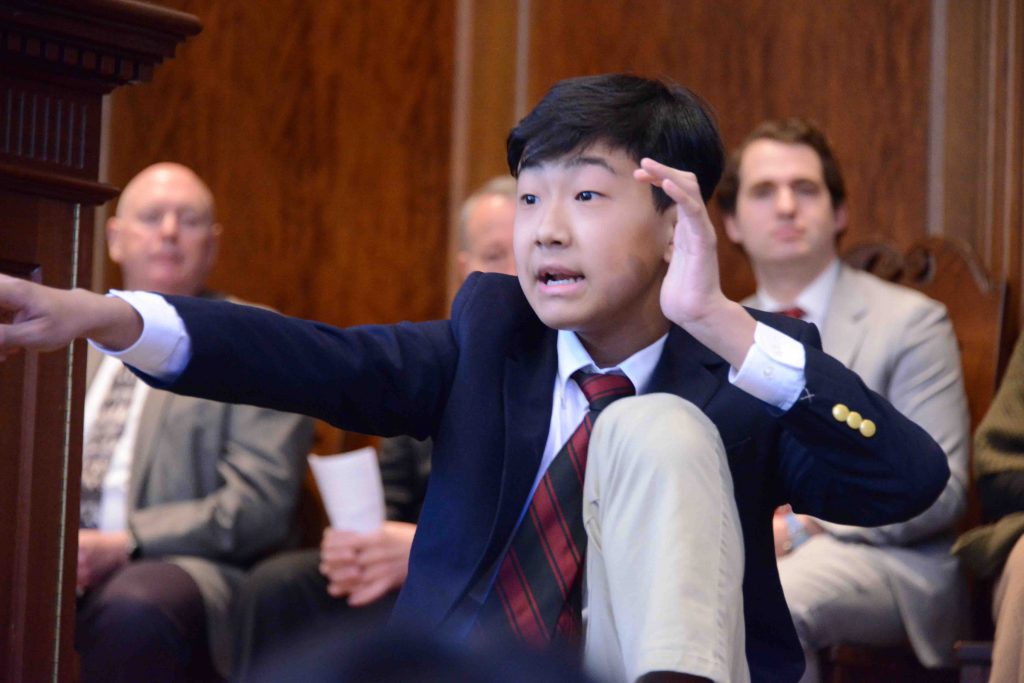Exelauno Day: A Distinctly RL Tradition
On March 4, Roxbury Latin students and teachers celebrated a tradition that is uniquely RL: Exelauno Day dates back more than 130 years, when Classics master Clarence Willard Gleason inaugurated a celebration of the Classics, in which Greek students would be exempted from homework. Today, the event allows for the singular annual pleasure of hearing from boys of every age and level of exposure to Latin and Greek. (It is worth noting that the day continues to be one in which Greek and Latin students are exempted from homework!) Gleason chose March 4th as a punny reference to Xenophon’s Anabasis and its use of the verb “exelauno,” meaning “to march forth.”
During a special Hall, boys in Class VI through Class I competed in this year’s David Taggart Clark Competition in Greek and Latin Declamation—reciting the stirring words of Ovid and Cicero, performing the resonant fables of Aesop, and bringing to life the words of Vergil himself. This year’s winners were Simba Makura of Class V (Lower School Latin), Marc Quintanar of Class II (Upper School Latin), and Matt Hoover of Class II (Greek).
Classics Department Chair Jamie Morris-Kliment served as master of ceremonies, and the judges, to whom RL extends its heartfelt gratitude, were Dr. Todd Alexander Davis ’91, Chair of Classics at Belmont Hill; John T. Hamilton, Professor of German and Comparative Literature at Harvard; and Sally Hatcher, teacher of Latin at The Winsor School.
Congratulations to all the student declaimers, pictured here in a gallery by Mr. Pojman.
Lower School Latin
Eric Archerman, Class VI
Livy Ab Urbe Condita 1: 6-7 selections
“Romulus bests Remus and gives his name to the new city”
Nishant Singh Rajagopalan, Class VI
Adapted from Aesop’s Fables
“An amusing incident on the road between a father, son, and donkey”
Paul Louis Tompros, Class VI
Livy, Ab Urbe Condita, I. 39, 1-3
“Servius Tullius’s head catches on fire”
Maxwell Cohn Kesselheim, Class V
Livy, Ab Urbe Condita II.23
“A Plebian displays his scars from fighting wars abroad but gets no relief at home”
Avish Kumar, Class V
Ovid, Metamorphoses, 8, 203-216; 223-236
“Icarus ignores the advice of his father, Daedalus, about flying”
Simbarashe Makura, Class V
Ovid Metamorphoses XIII.95-122 (selections)
“Ajax argues that he, and not Odysseus, should have Achilles’s armor”
Liam Thomas Walsh, Class V
Ovid Metamorphoses XIII.205-237 (selections)
“Odysseus responds that he, and not Ajax, should have Achilles’s armor (cont.)”
Lucas James Numa, Class IV
St. Augustine, Confessions 6.viii.13
“A lesson in the transcendent and enduring power of love”
Eliot Daye Park, Class IV
Ovid, Metamorphoses, XIII. 789-869 (excerpts)
“Alypius becomes addicted to the gladiatorial games”
Omar Fayez Rahman, Class IV
Ovid, Metamorphoses, III. 379-401
“Echo, spurned by Narcissus, is doomed to life without a form”
Upper School Latin
Leonardo Bene, Class III
Ovid, Metamorphoses, X.13-39
“Orpheus begs the Gods of the Underworld to release his wife, Eurydice”
John Louis Tompros, Class III
Cicero’s Eighth Philippic (selections)
“Cicero demands that his fellow senators call the conflict with Mark Antony a war”
Marc Langlais Quintanar, Class II
Vergil, Aeneid VII.419-34, 445-55
“Allecto reveals herself and unleashes her fury”
Justin Rui-Ting Shaw, Class II
Vergil, Aeneid VII.435-46, 458-71
“Turnus mocks a goddess in disguise and is set aflame”
John Paul Buckley, Class I
Petronius, Satyricon 48
“Trimalchio displays his great learnedness”
Greek
Ezra Liebowitz, Class III
2 Samuel 1:17-27
“David’s Lament for Saul and Jonathan”
Matthew James Hoover, Class II
Plato, Apology, 28d – 29b
“Socrates thinks death ought not be feared”
Benjamin Dorrance Kelly, Class I
Iliad Book III, lines 399-436 (selections)
“Long-suffering Helen berates Aphrodite and then Paris”

